- Home
- Scott Westerfeld
Peeps p-1 Page 20
Peeps p-1 Read online
Page 20
But not of cats.
There were dozens of them, maybe a hundred, perched on postboxes and garbage bags, crowding the stoops across the street, all watching me with the same expression of mild amusement.
My knees grew weak, and the world went dizzy; I almost fell to the concrete. But Morgan was right behind me. I pulled my belt from around my waist and cinched it through the curving handles of the front door. Then I took a few deep breaths until the faintness passed.
The cats around me hadn’t moved. Maybe Dr. Rat was right—they were nonviolent.
Seconds later, Morgan approached the other side of the glass door, grabbed the inside handles, and pulled. The belt held tight. It would take her a while to wear down the leather, or for some random passerby to let her out.
I stumbled back from the door.
“Cal!” she called, her voice muffled through the glass. “Stop!”
I shook my head and turned to walk down the street, ignoring her cries.
“Cal!” The sound faded behind me.
The cats watched placidly, no concern in their expressions. But somehow their collective gaze kept me from running—some threat implicit in their eyes suggested that if I disturbed the quiet street, they would turn into an angry horde and devour me.
So I walked slowly, feeling their red-flickering eyes with every step.
Another two blocks up was Flatbush Avenue, busy and normal and not overrun with cats. I stuck out my shaking arm and hailed a taxi to Manhattan.
Halfway across the bridge, my phone rang. It was the Shrink.
“Kid, we need to talk.”
“Don’t call me Kid!”
There was a long silence on the other end. Evidently, the words had surprised the Shrink just as much as they had me.
“Um, if you don’t mind?” I added lamely.
“Certainly … Cal.”
I frowned. “Hey, wait a second. I thought you didn’t like talking on phones.”
“I don’t, but the world is changing, Cal. And one must adapt.”
I wanted to point out that telephones were so 1881—not exactly cutting edge—but the Shrink’s choice of words froze the remark in my mouth.
“The world is changing?” I said hoarsely.
“You hadn’t noticed?”
“Um, I’d say there’s been some weird stuff going on.” I cleared my throat. “And I’m starting to feel like nobody’s keeping me in the loop.”
“Well, perhaps you’re right. Perhaps we haven’t been fair to you.”
The cab slowed as the bridge descended into Chinatown, and a few moments of reception crackle interrupted the conversation. Ahead of me were crowds of workday pedestrians—all within arm’s length of one another—a perfect breeding ground for infection and for sudden violence spinning out of control.
When the rattle in my ear subsided, I said, “And you’re going to tell me what’s going on?”
“Of course. I, for one, have always wanted you to know what’s going on. I’ve always trusted you, Cal. But you see, you’re so very young compared to the rest of us.”
“The rest of the Night Watch?”
“Not the Watch. We carriers, Cal, with all those centuries behind us. And those of us in the old families. Some thought you wouldn’t understand the way things were changing.” She sighed. “I’m afraid we’ve been treating you as a bit of a human.”
“Um, last time I checked, I was one.”
The Shrink laughed. “No, Cal, you’re one of us.”
I groaned, not wanting to get into some weird semantic argument. “Could you just tell me what’s going on!”
“I’ll let her tell you.”
“Her who?”
“Just get where you’re going. Don’t worry. She’ll be there.” Click. She’d hung up.
How did the Shrink know where I was going? I couldn’t imagine the Mayor’s office having tapped my phone. That was way too high-tech for them. Then I remembered Cornelius sitting by the door, yowling. He’d smelled Morgan out there, which meant that Morgan could have heard my conversation with Lace. I replayed it in my mind… Bob’s on Broadway and Eleventh, I had helpfully said aloud.
She would be waiting? But who was she?
I dialed Lace’s number on my cell, but there was no answer. Out of service, the recorded voice said. We were approaching Houston, the cars around us slowing to a walking pace. I paid, jumped out, and ran toward Broadway and Eleventh, trying to untangle the meaning of the Shrink’s call.
The Shrink knew that I knew. My first thought was that Chip had broken his promise and talked to the Mayor’s office, but then Morgan’s words at my door came back to me: “I don’t forget the names of people I sleep with, Cal Thompson.”
Morgan knew that I had forgotten her last name, something the Shrink had always chided me about. But how would Morgan have known that, unless someone had told her?
They were all in it together—Morgan Ryder, the Shrink, and the Night Mayor, along with the other carriers and the old families of New York—all of them knew something about my strain of the parasite and what it meant. They had kept me in the dark from the beginning.
And if it hadn’t been for Lace’s detective work, I would still be in the dark.
Lace … I thought, speeding up.
Rebecky greeted me at the door. “Hey, Cal! Hungry again already?”
I tried not to pant. “Yeah. Meeting someone.”
“So I noticed.” Rebecky winked. “I never forget a face. She’s right back there.”
I nodded and headed toward the rear corner table, still breathing heavily, still dizzy, still trying to put together everything I had to explain to Lace, so harried and distracted that it wasn’t until I’d thunked myself down into the booth that I realized the girl sitting across from me wasn’t Lace.
It was Sarah.
Chapter 20
THE PARASITE OF MY PARASITE IS MY FRIEND
Here is the story of how parasitic wasps saved twenty million lives.
But to tell the tale, first you get to hear about mealworms, a kind of insect that’s just as unpleasant as its name. Mealworms aren’t very big—a cluster of thousands looks like a tiny white speck. But this single speck can devastate whole continents. Here’s how:
The average mealworm has eight hundred kids, almost all of which are female. Each of these offspring can have eight hundred more kids. Do the math: One mealworm can produce five hundred million great-grandchildren. And they aren’t really worms at all; the young ones can fly, carried from plant to plant on the wind, spreading infection as they go.
Thirty years ago, a species of mealworm rampaged through Africa, attacking a staple crop called cassava and almost starving twenty million people. That’s a pretty big death toll for a microscopic parasite. Fortunately, however, cassava mealworms have their own parasite, a species of wasp from South America.
A word about parasitic wasps: nasty. Instead of a stinger, they kill with something called an ovipositor, which injects eggs instead of venom. And, believe me, these eggs are much worse than poison. At least with poison, you die fast.
Here’s what wasp eggs do to their unlucky hosts: Some hatch into “soldiers,” which have big teeth and hooked tails. They roam around in the victim’s bloodstream, sucking out the guts of any children left by other wasps. (Parasitic wasps are very territorial.) Other eggs hatch into wasp larvae, which are basically big bloated stomachs with mouths. Protected by their soldier siblings, they ravenously consume the host from within, sucking away its juices as they grow into wasps themselves. Once they’re big enough to grow wings, the larvae eat their way out into the world and fly off to lay more eggs. The soldiers don’t leave, they just stay behind with the dried-up, dying host, having done their duty for their waspy brothers and sisters. (Isn’t that sweet?)
So what happened in Africa? Long story short: The crops were saved.
Once the right species of wasp was let loose, the mealworms were dead meat. Mealworms may spread as fast
as the wind, but wherever they go, the wasps can follow. Wasps can fly too, after all, and they’re pretty much psychic when it comes to finding mealworms. If a single plant in a huge field is infected, the wasps will find the mealworms and inject them with their eggs. No one really knows how wasps track down microscopic mealworms, but some scientists have an intriguing theory:
The infected plant asks for help.
That’s right: When a cassava plant is attacked by mealworms, it begins to send out signals to any wasps in the area. Some unknown chemical rises up and draws the wasps toward it, like a big red highway flare saying, Help me! Help me!
Of course, another way to translate the message is: Mealworms! Get your hot delicious mealworms!
You could say that the cassava and the parasitic wasp have an evolutionary deal: “I’ll tell you when I’m infected with mealworms, and you come and deposit your deadly eggs in them.”
It’s a great relationship, because the parasite of your parasite is your friend.
Chapter 21
EX
“Hiya, darling,” Sarah said. “You’re looking good.”
I didn’t say anything, paralyzed by the sight of her. Sarah was utterly transformed from my last glimpse before the transport squad had taken her away. Her hair was clean, her fingernails pink and neatly trimmed; there was no demented gleam in her eye. As her familiar scent reached me through the smell of grease and frying eggs, Bob’s Diner seemed to shudder, as if time were snapping backward.
She was even wearing a thick black leather wristband, a definite reference to Elvis’s 1968 Comeback Special. Very appropriate.
Rebecky slapped down a cup of coffee in front of me, breaking the spell. “Thought I recognized you,” she said to Sarah. “It’s been a while since you’ve been in here, right?”
“Been out of town. Hoboken mostly, then a few days in Montana, of all places,” Sarah said, shaking her head. “But I’m back to stay.”
“Well, good. Looks like Cal here sure missed you.” She patted me on the shoulder, chuckling at my blank expression. “The usual, Cal?”
I nodded. When Rebecky had gone away, I found my voice. “You’re looking good too, Sarah.”
“Been putting on some weight, actually,” she said, shrugging and taking a huge bite of the hamburger in front of her.
“It suits you,” I said. “Makes you look more…”
“Human?” Sarah grinned.
“Yeah, I guess.” My mind started to struggle for a better word, but an alarm was going off deep in my brain. “Where’s Lace?”
“Lace, huh?” Sarah frowned. “What kind of name is that?”
“Short for Lacey. Where is she? You guys didn’t…” I looked around for the Shrink’s minders, sniffed the air for other predators. All I smelled was Bob’s: potatoes and meat and onions, all turning brown on the grill—and Sarah, who smelled of family.
She shrugged. “Look, Cal, I don’t know who you’re meeting here. Dr. Prolix just called me ten minutes ago and told me to come here and talk to you. She thought you’d listen to someone your own age. She said maybe you needed a jolt.”
“Well, mission accomplished on that.”
“And she figured it wouldn’t hurt if you saw how well I was doing.”
“Yeah. You look … so sane.”
“Am sane. Feels good.”
I shook my head, trying to think straight through the tangle of memories welling up in me. Lace would get here any moment now. Maybe I could run and try to catch her on the way. If Lace said the wrong thing in front of Sarah, the Watch might figure out that she knew too much.
I looked out the window, searching the street for Lace’s face among the lunchtime crowds. But my gaze kept coming back to the girl in front of me—Sarah, alive and well and human.
I couldn’t run yet; I had to know… “What happened?”
Sarah chewed a bite of burger thoughtfully, then swallowed. “Well, first this total dickhead gave me a disease.”
“Oh, yeah.” I drank some coffee, frowned at its bitterness. “I never had a chance to say sorry about that. I didn’t know—”
“Yeah, yeah. I guess we’re both to blame. Safe sex, blah, blah, blah.” Sarah sighed. “Then there was my little … breakdown. But you saw most of that.”
I nodded. “Until you disappeared.”
Sarah took a long breath, staring out the window. “Well, the parts you missed out on are kind of hazy for me, too. Sort of like a long, bad dream. About being hungry.” She shuddered. “And eating. Then there you were again, rescuing me.” She smiled tiredly then took another bite.
“Rescuing you?” I swallowed, never having thought of it that way myself. “It was the least I could do. But, Sarah, how did you get so normal? So fast?”
“Good question, which reminds me.” She pulled out a bottle of pills, dumped two into her palm, and swallowed. “Two with every meal.”
I blinked. “There’s a cure?”
“Sure. They had me straightened out about six hours after I got to Montana.”
“When did that happen? The cure, I mean.”
“At least seven hundred years ago.”
There it was again, that seven-hundred-year thing. “The plague? This doesn’t make any sense, Sarah.”
“It will, Cal. Just listen up. I’m here to tell you everything. Doctor’s orders.” She bit deep into her burger, hurrying now that she was only a few swallows from the end.
“Which doctor? Prolix?”
“Yep, the Shrink. She’s been telling me all about what’s coming.” Sarah looked out at the crowds on the sidewalk. “They figured I could take it, because of my personal eating habits lately.” She looked down at her hamburger with momentary suspicion, then took another bite. “And because they don’t have time to mess with me. Or with you, anymore. Time to face facts, Cal.”
Suddenly, the restaurant felt overcrowded, claustrophobic. I could smell the people in the booth behind me, the pressure of the passersby on the street. “The disease is out of control, isn’t it? We’re going to wake up one day in one of those zombie-apocalypse movies, the parasite spreading faster than anyone can stop it.”
“No, Cal. Don’t be silly. The disease is in control, the way it should be. The parasite’s calling the shots now.”
“It’s doing what?”
“It’s in charge, making things happen. The way it’s supposed to. The Night Watch was always just a holding pattern, keeping down the mutation while waiting for the old strain to come back.”
I shook my head. “Wait. What?”
Sarah held up her fork and knife, looking from one to the other. “Okay. There’s two versions of the parasite. The new kind and the old kind. Right?”
“Two strains, I know.” I nodded. “And we’ve got the new one, you and me.”
Sarah sighed. “No, dickhead, we have the old kind. The original.” She rattled her pill bottle. “This is mandrake and garlic, mostly. Totally old-school. Until seven hundred years ago, people used to totally control this disease.”
“Until the plague?”
“Bingo. That’s when the new strain showed up.” Sarah shook her head. “You’ve got to blame the Inquisition for that. You know, when Christians got it into their heads that cats were evil and started killing loads of them? That was bad for the old version of the parasite, seeing as how it jumps back and forth between felines and humans.”
“Right… I know about that. But that’s the old version?”
“Yes. Pay attention, Cal. As I was saying, it’s 1300 a.d. and everyone’s killing cats. So with hardly any cats around, the rat population grows like crazy. More human-to-rat contact, evolution of various diseases, fleas and ticks, blah, blah, blah.” She waved her hand. “Plague.”
“Um, I think you’re skipping over something there.”
She snorted. “I’m not the one going for a biology degree. I’m just a philosophy major who eats people. But here’s the bio-for-philosophers version: A new strain of the parasit
e appeared, one that moved back and forth between rats and humans, without cats. Of course, as with any new strain, the optimum virulence was a mess; the peeps were much more violent and difficult to control. A total zombie movie, like you said.”
“And the old strain went underground.”
“Very good.” Sarah smiled. “They told me you’d understand.”
“But that was Europe. This is New York.”
“Rats go everywhere, Cal. They love ships, so of course the new parasites made it to the New World. Even here, the old strain was pushed down into the deep.”
“But now it’s coming back up,” I said. “Why aren’t we doing something about it? Why are the old carriers hiding it from the rest of the Watch?”
“Excellent questions.” She nodded slowly, chewing the last bite of her hamburger. “That’s what you scientists never seem to understand: The whys are always more important than the hows.”
“Sarah, just tell me!”
“Okay.” She placed her palms on the table. “Feel that?”
I looked at the surface of my coffee; its black mirror reflected the lights overhead with a pulsing shimmer. “You mean the subway going by?”
She shook her head, her eyes closed. “Feel deeper.”
I placed my hands on the table, and as the train faded, I felt another, more subtle shudder in its wake. Like something disturbed in its sleep, turning over. Like the trembling I’d felt through my cowboy boots, the first time I’d seen the peep cat.
Sarah opened her eyes. “Our strain is coming up because it’s being pushed up.”
I remembered the unseen thing I’d smelled in the Underworld, and the shudder in my hands took over my whole body for a moment. “By what?”
Sarah lifted her palms from the table, sighed, then shrugged. “There are a lot of things down there, Cal, things human beings haven’t seen in a long time. We lost a lot of knowledge during the plague. But the old guys do know one thing: When the ground starts to tremble, the old strain will rise up. They need us.”

 Uglies
Uglies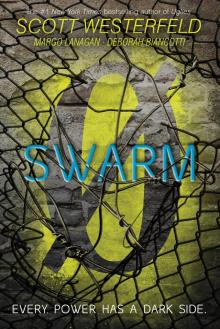 Swarm
Swarm Pretties
Pretties Zeroes
Zeroes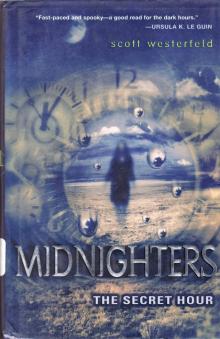 The Secret Hour
The Secret Hour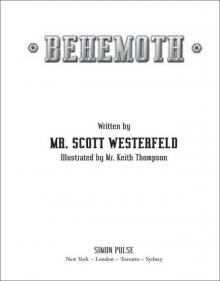 Behemoth
Behemoth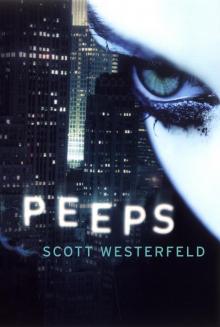 Peeps
Peeps Specials
Specials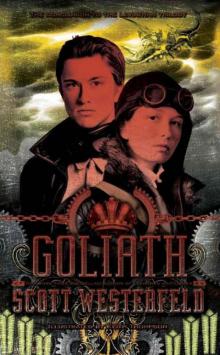 Goliath
Goliath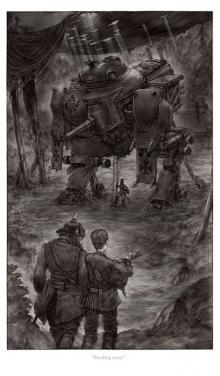 Leviathan
Leviathan Extras
Extras Shatter City
Shatter City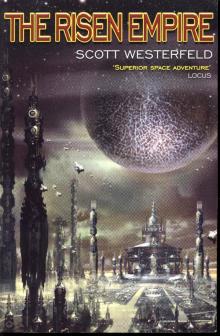 The Risen Empire
The Risen Empire Touching Darkness
Touching Darkness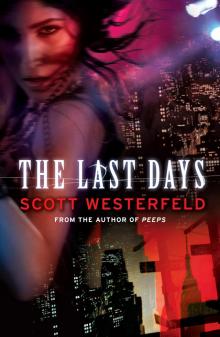 The Last Days
The Last Days So Yesterday
So Yesterday The Killing of Worlds
The Killing of Worlds Afterworlds
Afterworlds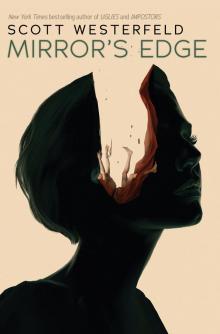 Mirror's Edge
Mirror's Edge Evolution's Darling
Evolution's Darling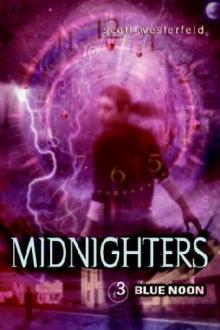 Blue Noon m-3
Blue Noon m-3 Touching Darkness m-2
Touching Darkness m-2 Impostors
Impostors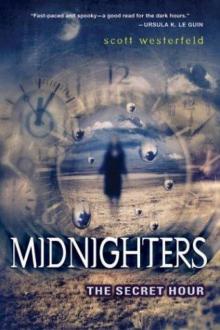 The Secret Hour m-1
The Secret Hour m-1 Leviathan 01 - Leviathan
Leviathan 01 - Leviathan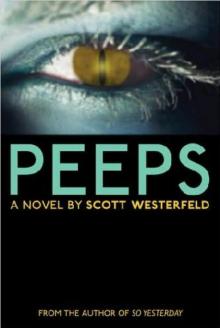 Peeps p-1
Peeps p-1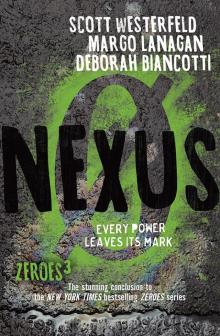 Nexus
Nexus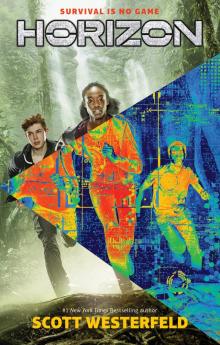 Horizon
Horizon Bogus to Bubbly
Bogus to Bubbly Goliath l-3
Goliath l-3 The Last Days p-2
The Last Days p-2 Behemoth l-2
Behemoth l-2 Stupid Perfect World
Stupid Perfect World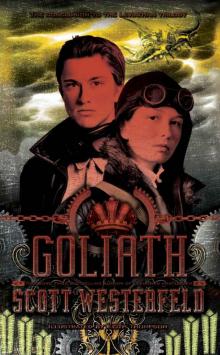 Goliath (Leviathan Trilogy)
Goliath (Leviathan Trilogy)